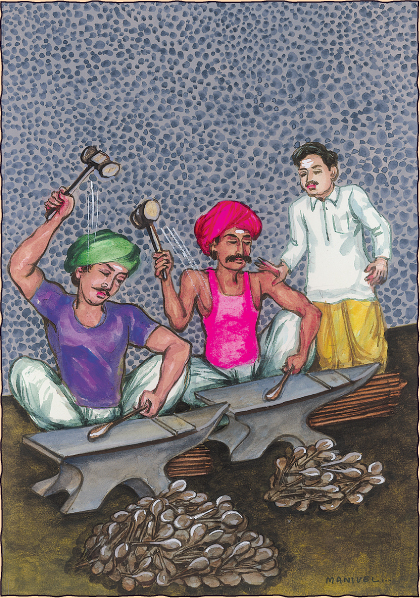THE FIFTH RESTRAINT
Patience
Kshamā क्षमा
 ATIENCE, OR KSHAMĀ, THE FIFTH YAMA, IS AS ESSENTIAL TO THE SPIRITUAL PATH AS THE SPIRITUAL PATH IS TO ITSELF. IMPATIENCE IS A SIGN OF DESIROUSNESS TO FULFILL UNFULfilled desires, having no time for any interruptions or delays from anything that seems irrelevant to what one really wants to accomplish.§
ATIENCE, OR KSHAMĀ, THE FIFTH YAMA, IS AS ESSENTIAL TO THE SPIRITUAL PATH AS THE SPIRITUAL PATH IS TO ITSELF. IMPATIENCE IS A SIGN OF DESIROUSNESS TO FULFILL UNFULfilled desires, having no time for any interruptions or delays from anything that seems irrelevant to what one really wants to accomplish.§
We must restrain our desires by regulating our life with daily worship and meditation. Daily worship and meditation are difficult to accomplish without a break in continuity. However, impatience and frustration come automatically in continuity, day after day, often at the same time—being impatient before breakfast because it is not served on time, feeling intolerant and abusive with children because they are not behaving as adults, and on and on. Everything has its timing and its regularity in life. Focusing on living in the eternity of the moment overcomes impatience. It produces the feeling that one has nothing to do, no future to work toward and no past to rely on. This excellent spiritual practice can be performed now and again during the day by anyone.§
Patience is having the power of acceptance, accepting people, accepting events as they are happening. One of the great spiritual powers that people can have is to accept things as they are. That forestalls impatience and intolerance. Acceptance is developed in a person by understanding the law of karma and in seeing God Śiva and His work everywhere, accepting the perfection of the timing of the creation, preservation and absorption of the entire universe. Acceptance does not mean being resigned to one’s situation and avoiding challenges. We know that we ourselves created our own situation, our own challenges, in a former time by sending forth our energies, thoughts, words and deeds. As these energies, on their cycle-back, manifest through people, happenings and circumstances, we must patiently deal with the situation, not fight it or try to avoid it or be discouraged because of it. This is kshamā in the raw. This is pure kshamā. Patience cannot be acquired in depth in any other way. This is why meditation upon the truths of the Sanātana Dharma is so important.§
It is also extremely important to maintain patience with oneself—especially with oneself. Many people are masters of the façade of being patient with others but take their frustrations out on themselves. This can be corrected and must be corrected for spiritual unfoldment to continue through an unbroken routine of daily worship and meditation and a yearly routine of attending festivals and of pilgrimage, tīrthayatra.§
Most people today are intolerant with one another and impatient with their circumstances. This breeds an irreverent attitude. Nothing is sacred to them, nothing holy. But through daily exercising anger, malice and the other lower emotions, they do, without knowing, invoke the demonic forces of the Narakaloka. Then they must suffer the backlash: have nightmares, confusions, separations and even perform heinous acts. Let all people of the world restrain themselves and be patient through the practice of daily worship and meditation, which retroactively invokes the divine forces from the Devaloka. May a great peace pervade the planet as the well-earned result of these practices.§
The next time you find yourself becoming impatient, just stop for a moment and remember that you are on the upward path, now facing a rare opportunity to take one more step upward by overcoming these feelings, putting all that you have previously learned into practice. One does not progress on the spiritual path by words, ideas or unused knowledge. Memorized precepts, ślokas, all the shoulds and should-nots, are good, but unless used they will not propel you one inch further than you already are. It is putting what you have learned into practice in these moments of experiencing impatience and controlling it through command of your spiritual will, that moves you forward. These steps forward can never be retracted. When a test comes, prevail.§
Sādhakas and sannyāsins must be perfect in kshamā, forbearing with people and patient under all circumstances, as they have harnessed their karmas of this life and the lives before, compressed them to be experienced in this one lifetime. There is no cause for them, if they are to succeed, to harbor intolerance or experience any kind of impatience with people or circumstances. Their instinctive, intellectual nature should be caught up in daily devotion, unreserved worship, meditation and deep self-inquiry. Therefore, the practice, niyama, that mitigates intolerance is devotion, Īśvarapūjana, cultivating devotion through daily worship and meditation.§

